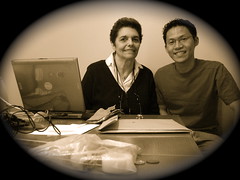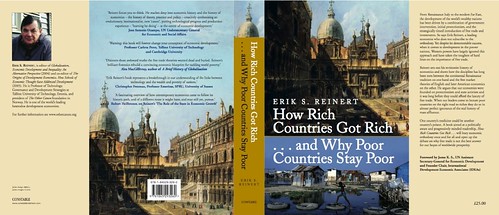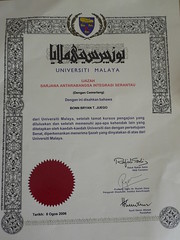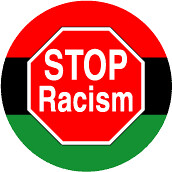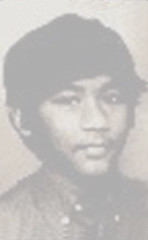
'You have a curious blend of good luck and bad luck', said my supervisor, Erik S. Reinert, over the phone on my birthday (17 January) referring to my adventures here in Europe since I left the Philippines on September 2006. 'A curious blend' indeed – some doors have had been closed over the months but not without opening great windows of opportunities!
At the beginning of the new year I sent messages to my family and friends with the theme 'Life is a game of forgetting and remembering'. We win the game when we remember what motivates us, what inspires us, what has helped us, what has made life worthwhile; and when we forget the old things that have stolen our dreams. We lose the game when we remember the things of no value, the things gone and will never come back; and when we forget the lessons of past mistakes.
I have once written to my siblings about the loving and lovely virtue of our mother that we must all imbibe and be mindful of all the time: her secret to being content in all circumstances, 'a gift of peace' I would call – be free from expectations; want nothing from anyone; be generous; do not worry and try to solve everything on your own, pray, leave some spaces for God to come and help you; see the advantages hidden in any unfortunate circumstances.... I actually believe that these values are innate in each and every human being. Not having these only means that they have gone missing in us for whatever reasons, and thus recovering them back would be worthwhile and meaningful.
One of the frustrating experiences I encountered over the last few months was when I had hoped to apply for a fellowship at a business school in Northern Europe on a research project on 'cultural diversity' in emerging markets and developing countries. It was unfortunate that my application documents reached the department a day after the deadline. And it was painful to think that my application documents – written and sent in good faith, with the best intentions, and with all the efforts and hopes put into them – was immediately rejected and sent back to me without even literally opening the envelope. It was totally disappointing at first especially because I believe that notwithstanding the failure of my documents to reach the department on time, it is just proper that the envelope should have at least been opened, and hence been considered for its content, and not simply at face value.
Anyway, frustrations and disappointments – like any other emotions, things, and people – are essentially impermanent; they come and go. Now, my research proposal may have not reached its intended audience, but I am posting a copy of it here with the world as its audience. After all, and especially because of the structural logic of today's world, ideas are not to be enclosed within school walls. The world is their home.Note: For reasons of space, the sections 'Work Schedule' and 'References' of the research proposal have been deleted in this posting.
The Culture of Political Economy, or the Political Economy of Culture
The Constitution of Cultural Diversity in Southeast Asian Development Strategies
A RESEARCH PROPOSAL
BONN JUEGO
Introduction
I propose a PhD research project that will examine the constitution of cultural diversity in the development strategies of the developing countries and emerging markets of Southeast Asia in pursuit of competitiveness through an innovative knowledge-based society from the 1990s to the first decade of the 21st century. Taking contrasting development strategies of the distinctive political-economic-cultural structures, hence social relations, of the Philippines, Malaysia, and Singapore – generally characterized as neo-liberal, neo-statist, and neo-corporatist, respectively (see Table 1) – the research seeks to combine the concepts and tools from critical political economy and evolutionary development economics to produce a distinctive approach in understanding the constitutive role of cultural diversity in political and economic activities, political and economic institutions, and hence development strategies in the emerging markets and developing countries of the Southeast Asian region. In doing so, the research addresses the omission, as well as eschews the reductionism, of mainstream accounts found in the fields of business, development, economics, and international political economy in understanding the challenges of culture, especially of cultural diversity, in the emergence of knowledge-based societies in the dynamic region of Southeast Asia under conditions of globalisation.
Research Questions
The process of globalisation ushers in tremendous reorganisation of production both in the developed and developing worlds towards the consolidation of a new accumulation regime as depicted in the narrative of a ‘knowledge society’ in which development is to be pursued through the promotion of competitiveness, entrepreneurship, and innovation. The consolidation of a new economic regime with distinctive economic regularities may be either ‘organic’ or ‘arbitrary, rationalistic, and willed’ depending on the regime’s success or failure in realising a ‘structured coherence’ among technological innovations, political institutions, economic forms, cultural practices, and intellectual understanding that would reorganise the entire social formation (Gramsci 1971). In other words, the new ‘techno-economic paradigm’ is a product of the interaction among technology, politics, economy, and culture leading to certain economic pattern (Perez 2002). Hence, the emergence of a ‘knowledge society’ constitutes a social relation in which ‘the political’, ‘the economic’, and ‘the cultural’ spheres are organically connected to, rather than separate from, one another. As such, it is sensible to conceive of development as a social relation that constitutes both ideational and material aspects.
The Southeast Asian region is, as ever, marked by national differences on: [a] levels of economic development, [b] characteristics of political regimes, and [c] attributes of culture (see Table 1). These varying domestic configurations from society to society within the globalising geographical landscape in the region give rise to distinct arrays of interests and distinct projects from society to society in pursuit of their shared idea for reform of their respective ‘business climates’ to promote investment and domestic entrepreneurship and to enhance innovation. The combined yet uneven character of development in Southeast Asia thus requires different political approaches and economic policies from society to society in the region in pursuit of development. At the heart of this dynamics is the role played by cultural diversity as an ideational feature of Southeast Asian societies in relation to the materiality of the political economy of the region. The culturally diversed, as well as the politically and economically different, societies of Southeast Asia signify the co-evolution of the processes constitutive in the ideational aspects of cultural diversity with the processes involved in the materiality of political economy. The dynamics of these processes, including their conjoint impact, on development is bewilderingly complex, yet interesting. It is this distinctive and novel feature of ‘culture and political economy’ (ie, the political economy of culture, or the culture of political economy) of the Southeast Asian region that demands explanation, and which is the principal object of enquiry in this proposed research.
How is cultural diversity constituted in the varying domestic development strategies of the Philippines, Malaysia, and Singapore? And how does the political economy of development in these countries, which are oriented towards knowledge-based society, impact on their diversified cultural configurations?
Hypothesis
Given said main problematique the proposed research puts forward a rather general hypothesis that:
While the Philippines, Malaysia, and Singapore have different political regimes, levels of economic development, and cultural attributes, their development strategies share common goals for competitiveness through the realisation of an innovative knowledge-based society in response to globalisation. The issue of cultural diversity as a constitutive feature of their respective societies, while distinctive in their respective social relations, is inflected to suit the requirements of global competitiveness. Cultural diversity then is regarded both a challenge for political crisis management and a tool for economic development under conditions of a knowledge society.
This general hypothesis is laid down here simply as a guide for the conduct of the research. The foremost aim of the proposed research is to look for novelties in this theme of cultural diversity and development.
Review of Literature
Much of the literature in business studies, development studies, economics, social sciences, and (international) political economy have not addressed the theme related to the challenges of cultural diversity in emerging markets and developing countries at the epoch of globalisation. First, mainstream accounts have omitted the constitutive role of culture (and of cultural diversity in this case) in political and economic activities and institutions; and hence they have approached the phenomenon in the fashion either of essentialism or of reductionism between culture and political economy. And, second, hardly anyone has dealt with this theme seriously with reference to the dynamic emerging markets and the puzzling developing countries in the Southeast Asian region.
In business studies, a number of research have been done providing causality between a culturally diverse work force, on the one hand, and a firm’s organisation, behaviour, and performance, on the other. These are empirical studies addressing issues such as a firm’s motivation in hiring a diverse work force (e.g., Carr 1993; Cox and Blake 1991; Johnson 1999) and the implications of cultural diversity of the work force for a firm’s performance (e.g., Thomas 1999; Hartenian and Gudmundson 2000). Aside from the fact that much of the firms studied are located in the US, such studies, however, easily neglect the dynamic processes and factors exogenous to the firm, providing stories of success or failure as if there is such a thing as a ‘representative firm’ as trivialised in ‘standard textbook economics’. Such studies also lose sight of the fact that each and every firm is unique (Penrose 1959 [1995]); that a firm exists to avoid transaction costs (Coase 1937 [1991]); and that a firm is capable of developing their ‘pool of stability’ through planning, research, and management in responding to the ever changing, uncertain competitive environment within which it operates (Coase 1937 [1991]; Chandler 1990; Best 1990; Lazonick 1991; Chandler, et. al. 1997). Hence, a research that focuses on the complex processes involved in an environment of competitive uncertainty seems to be much more meaningful for firms to guide their provision of ‘pools of relative certainty’ (Penrose 1959 [1995]) within which they could organise their strategic and innovative responses to external volatility.
In evolutionary economics, far more investigation is needed into the roots and trajectory of (uneven) development in the developing countries. The pioneering works on national systems of innovation (NSI) approaches of the Freeman-Lundvall-Nelson persuasion (Freeman 1987; Lundvall 1992; Nelson 1993) have been essentially crafted to understand the synergy among the government, industry, academe, and other social actors in the process of innovation in the contexts of developed, relatively homogenous, and to a large extent Scandinavian societies. Recent improvisations of the NSI approach have however attempted to address the challenges of the globalising learning economy as developing countries become increasingly integrated into this trend towards a knowledge society. Here, the idea of ‘tacit knowledge’ in which culture and cultural diversity may be both essential and crucial for the long-term success of developing countries is worth exploring (e.g., Ernst and Lundvall 2004).
In social sciences and economics, most accounts tend to either resort to the subsumption of economic activities under broad generalisations about social and cultural life (for instance, the ‘culturalisation’ of economic life in the new economy, in Lash and Urry 1994; and the discursive ‘cultural materialism’, in Williams 1980 and in Milner 2002), or opt for reification of the market and at the same time the abstraction of the economy into mathematical calculations as if economic activities are devoid of the larger extra-economic context and supports (e.g., Samuelson 1948; Krugman 1996). The former’s discursive predisposition glosses over the materiality as well as the specificities of economic activities, contradictions, and institutions. On the other hand, the latter provides the theoretical underpinnings of economic reductionism, treating the economy with rigid economic laws in an ahistorical fashion. Hence, the constitutive material role of ‘social variables’ such as cultural diversity, which are traditionally regarded as extra-economic in mainstream economics, is missing in these literatures.
In (international) political economy, the dynamics specific to the region of Southeast Asia is undertheorised, especially in the analysis of the global political economy of development since the post-War (sometimes referred to as ‘Fordist’, mass production – mass consumption ‘régime of accumulation’ [Aglietta 1979; Jessop 2001; Boyer, et.al. 2002]; or as ‘mass production paradigm’ [Perez 2002]). Most literatures on the political economy of development have focused on the US and Europe (Atlantic Fordism), Latin America (‘populist’, import-substitution industrialisation), and East Asia (national developmentalism) to provide various accounts of social structural changes that have occurred in particular phases of capitalist development. Even the powerful narratives of the Aglietta-Lipietz-Boyer ‘régulation schools’, which attempted to develop a deep institutionally sensitive historical and comparative analyses of capitalist development, have missed out the Southeast Asian region (Aglietta 1979; Lipietz 1985, 1987; Boyer, et. al. 2002). The same goes with the ‘post-régulation approach’ being developed recently to understand the dynamics of contemporary ‘knowledge-based economy’ as the post-Fordist accumulation régime that has emerged out of the crisis of the mass consumption – mass production regime (e.g., Jessop 2001; Aglietta 1998, 2000; Boyer 2000). It would be uncritical to hastily assume that these narratives, notwithstanding their powerful resonance in the academic literature, can be inflected to suit the dynamics in the Southeast Asian region. Hence, the dynamism and specificities of Southeast Asia must be given the seriousness it deserves.
These gaps as well as inadequacies in the existing literature in business studies, evolutionary economics, social sciences and economics, and (international) political economy thus prompt at least two main research objectives related to the challenges of cultural diversity in the developing countries in Southeast Asia. First, given the absence in the existing literature of an account of the co-evolution of the ideational (especially, on cultural diversity) and the material aspects intrinsic in the development process, the research hopes to make an original contribution to this largely unexplored, yet significant, terrain. Second, given the selectivity of existing narratives, the research considers the factors, processes, and phenomena left unstated, repressed, and marginalised in the official dominant discourses – that is to say, the question of cultural diversity in the political economy of development and the dynamism of the Southeast Asian region, both areas being marginal in established discourses.
Theoretical Framework
Most theories – through which the literatures reviewed above are examined – would founder on their inability to grasp the significance of the dynamic phenomenon of the co-evolution of the ‘ideational’ and ‘material’ processes and their conjoint impact in the constitution of development strategies in contemporary Southeast Asia. It is for this reason that an alternative approach derived from the combination of concepts and tools of critical political economy and evolutionary development economics will be utilised in this research. Accordingly, this alternative approach will prove useful to examine the relationship between cultural diversity and development in ontological, epistemological, and methodological terms.
The critical political economy approach understands phenomena as ‘social relations’ – in which ‘the political’, ‘the economic’, ‘the cultural’, ‘the ecological’, and all other spheres of social life are organically connected to, rather than separate from, one another. Through this approach, it can reveal not only the politics behind the economy, but the culture of political economy and the political economy of culture as well.
The non-equilibrium, non-physics based, and non-mathematical approach of evolutionary development economics (referred to as ‘Other Canon Economics’ in the works of Reinert, et. al. 2006, at http://www.othercanon.org) would be able to explain the complexities of cultural diversity in the broader economic development context. Its interest in the ‘economy’ as a real object, rather than the abstractions of ‘economics’, and its consideration of social variables that are traditionally excluded in mainstream, ‘standard textbook’ economics in explaining the uneven process of development are appropriate tools to grasp the significant phenomenon of the constitution of cultural diversity in the development strategies of developing countries.
Combining the concepts and tools from critical political economy and evolutionary development economics thus create an alternative approach viewed from comparative, critical, and inter-disciplinary perspective. Ontologically, the alternative approach does not naturalise theoretical objects such as technology, the economy, culture, and the development process; but regards them as historically specific, socially embedded, and, to a certain extent, socially constructed. Epistemologically, while it criticises the ahistorical, universalistic, and reductionist claims to knowledge of orthodox economics, the alternative approach understands phenomena through an assessment of the constitutive role of the material and ideational aspects in social relations and their impact on change. And methodologically, it takes into account the relevant and significant elements, factors, and processes excluded in mainstream literatures and theories so as to provide a certain degree of predictability vital for economic development strategy, political governance, and firm management.
Through this theoretical framework, the constitution of cultural diversity in the development strategies of the Philippines, Malaysia, and Singapore will be understood. Hence, cultural diversity is taken seriously in the context of social relations, while emphasising on the differences and specificities of national situations in particular historical moment.
Methodology
While the research highlights the role of cultural diversity as constituted in the different development strategies of the distinctive societies of the Philippines, Malaysia, and Singapore from the 1990s to the first decade of the 21st century, it regards culture as neither comprehensive nor exclusive. As such, the research will analyse the constitution of cultural diversity within social relations in which it is constituted. The general characteristics of these social relations are outlined in Table 1. The spheres of social life to be examined – ‘the political’, ‘the economic’, and ‘the cultural’ – are seen as constituting the ‘social relation’. That is to say, there is no clean separation among the three spheres and their relationship to one another may be seen as interrelated or reciprocal. While the development process and strategy is also to be understood as constituting a social relation, the definition of ‘cultural diversity’ will depend on the respective official development plans of the Philippines, Malaysia, and Singapore.
| TABLE 1 General Characteristics of Social Relations in Globalising Southeast Asia |
| Society | ‘The Political’ (State Form)
| ‘The Economic’ (Economic Policies) | ‘The Cultural’ (Cultural Diversity) |
| Philippines | Neo-liberal | Market-led, service-oriented, and partially agricultural | Homogenous (with peoples acknowledging one Filipino race); cultural diversity based largely on linguistic locales and religion) |
| Malaysia | Neo-statist | Focus on manufacturing and services | Heterogeneous; internal diversity with three major races: Malay, Chinese, and Indian |
| Singapore | Neo-corporatist | Strong manufacturing sector and knowledge-intensive services | Largely homogenous, yet increasingly becoming heterogeneous with the incorporation of foreign workers |
The research will thus make extensive reference to the official documents and development plans by respective governments of the Philippines, Malaysia, and Singapore in relation to their regard for cultural diversity, especially from the aftermath of the 1997 crisis to the present. In addition, documents from multilateral institutions and regional associations (which are now readily accessible from their official websites) such as the World Bank, IMF, WTO, ADB, APEC, and ASEAN shall also be looked into since these organisations have increasingly become domestic social forces in the arena of nation-states, and are active in policy advice as well as policy-making in the emerging markets of Southeast Asia, especially in the developing countries of the Philippines and Malaysia. In doing so, the research may identify the incorporation of cultural diversity in the broader development strategies to be either ‘organic’ or ‘arbitrary, rationalistic, and willed’ against the background of the structural requirements of competitiveness in a knowledge-based society. Further, an extensive review of literature on the culture and political economy of Southeast Asia will be done to unpack the region’s dynamism.
Significance and Prospective Contributions of the Study
The research hopes to immensely contribute to the inescapable link between theory construction and policy advice for real development, a qualitative improvement to the lives of all. In terms of policy, the research will not only reveal the constitutive role of cultural diversity in social relations and its concomitant dynamics to guide government, firms, and other actors; but it will also open up the exploration of the necessary synergy among political economic institutions and policies in pursuit of alternative development strategies especially needed for developing countries. In particular, it may usher in an idea to be reflected upon about the formulation of a coherent institutional fit and synergy for development among three organically connected spheres in the society: [a ] state form, or government structures and systems (the political); [b] economic policies on the relationship among economic activities and economic sectors, the relationship between financial capital and production capital, and the relationship among the factors of production such as capital, labour, land, and technology (the economic); and [c ] system of ideas and values , which includes way of thinking and lifeworld (the cultural).
And in terms of theory, it hopes to contribute to the broader debate, argument, and communication of innovative findings in the social sciences, business studies, development studies, development economics, evolutionary economics, (international) political economy, cultural studies, and Southeast Asian studies; as well as in the ‘post-disciplinary’ research agendas on ‘cultural political economy’ (http://www.lancs.ac.uk/ias/polecon/index.htm), ‘politics of global competitiveness’ (Cammack 2006), and ‘technology governance’ (http://hum.ttu.ee/tg/) recently set out by various academics and institutions.
